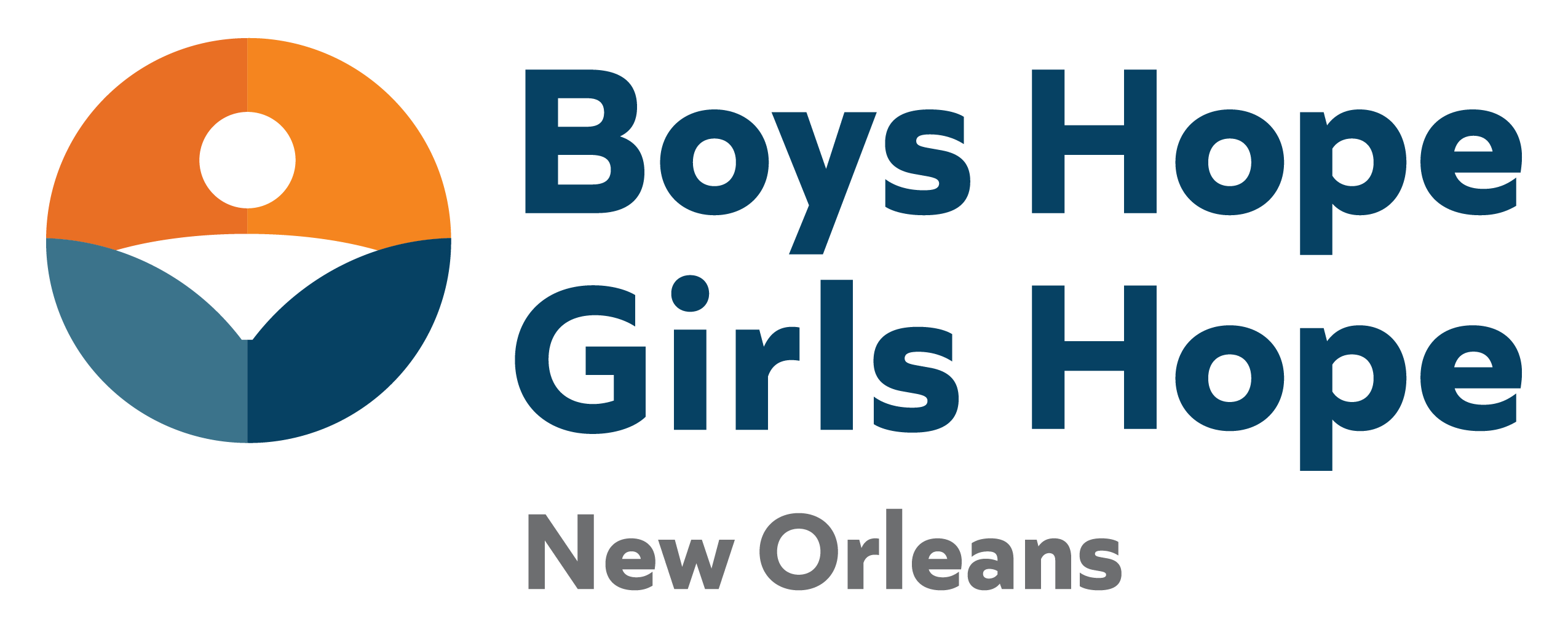We are Boys Hope Girls Hope of New Orleans
Boys Hope Girls Hope of New Orleans helps motivated middle, high school, and post-secondary students rise above disadvantaged backgrounds. Our goal is to graduate young people who are physically, emotionally, and academically prepared for post-secondary education and productive life, breaking barriers so they can become community-minded leaders.
Boys Hope Girls Hope firmly believes that young people have the power to overcome adversity, realize their potential, and help transform our world. They create these successes when we remove obstacles, support and believe in them, and provide environments and opportunities that build on their strengths.
Boys Hope Girls Hope of New Orleans is a proud member of the Boys Hope Girls Hope Network. Our Network Headquarters, located in St. Louis, Missouri, connects, provides leadership to, and offers signature college-preparatory programming to affiliates across the nation, Mexico, and Guatemala. Each affiliate is independently incorporated, governed by its own board of directors, and responsible for its own fundraising. Affiliation and services agreements link the Network to ensure mission and brand fidelity, quality operations, maximum functional capacity, and consistency in training, programmatic standards, and best practices.
OUR DNA
Academic Focus
We believe in the transformative power of education to develop lifelong learners.
Service & Community Engagement
We believe in the Jesuit-inspired, values-centered hallmark of building “persons for others.”
Family-like Settings Creating Sense of Belonging
We believe youth derive their energy and sustenance from exposure to nurturing environments.
Long-term & Comprehensive Commitment
We believe an enduring relationship with youth holds the most promise for attaining positive outcomes.
Faith-based Values
We believe that a loving God cares about the life of every individual and we manifest this belief.
Voluntary Participant Commitment
We believe in the motivational power of self-selection in the Boys Hope Girls Hope program.

LOCAL IMPACT
Since 1980, Boys Hope Girls Hope of New Orleans has been helping scholars rise up from disadvantaged backgrounds and strive for more. We serves youth who want to go to college and create successful futures for themselves. Our scholars have joined our program to receive support on their journey to college and beyond. They seek the academic resources, extracurricular opportunities, and mentor relationships we provide.
See how Boys Hope Girls Hope is prioritizing Diversity, Equity, and Inclusion.
HISTORY
LEADERSHIP
The Boys Hope Girls Hope of New Orleans Board of Directors and staff leadership collaborate to ensure mission fidelity, financial stewardship and transparency. This team of professionals is committed to continuous learning, effective programming and improvement through impact evaluation and innovation.

Chuck Roth
Executive Director

Cydne Shipley
Development Director

Nathan Stephens
Marketing and Community Outreach Associate
BOARD OF DIRECTORS
Board Chair
Jason Maurin
Louisiana CAT
Secretary
Ashley Solomon
Jefferson Parish Attorney's Office
Treasurer
Shelley Mayer
Ernst and Young
Tim Cragin
Entergy Corporation
Sally T. Duplantier
Community Volunteer
John C. "Sandy" Duplantier, Esq.
Festivious Gourmet
Jessica A. Dwyer, M. Ed.
St. Francis Xavier Catholic School
Rick Q. Flick
Banner Chevrolet Banner Ford
Roy A. Glapion
The Beta Group
Stephen Hanemann
Kean Miller LLP
John Hummel
Shell Oil (Retired)
Christopher M. Kenny
Gulf Point Advisors
Brandon Long
Federal Judge, Eastern District of Louisiana
Monique Christophe McConduit
Andrew Jackson Middle School
Stanton Murray
Murray Yacht Sales
Charles Rice
Southern University Law School
Brittany Whitsell
New Orleans Saints and Pelicans
Anthony Williams
Entergy Services, LLC
EX-OFFICIO
Rev. John Brown, S.J.
Thomas Moran
Father Mark Thibodeaux, S.J.
HONORARY BOARD COUNCIL
Most Rev. Greg Aymond
Patricia W. Cox
Patrick J. Browne, Esq.
John J. Dardis
Karen DeBlieux
Bonnie W. Eades
Jack V. Eumont
Annette M. Francingues
Sandra T. Henry
Edward J. Koehl Jr., Esq
Marianne K. Koehl, Esq.
Thomas M. Kitchen
Hon. Salvadore T. Mule
Ron H. Patron
Michael H. Rodrigue
George F. Sins, Jr.
Gordon Stevens
Lloyd A. Tate, C.P.A.
Mignhon Tourne’
Steven W. Usdin, Esq.
John E. Unsworth, Jr.
Edward C. Vocke, III
Errol G. Williams
